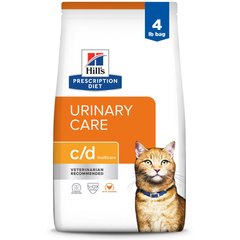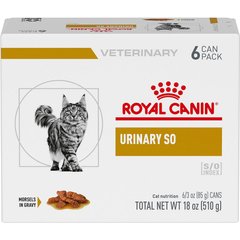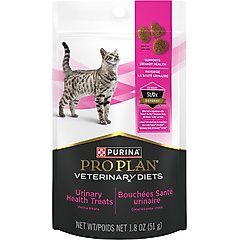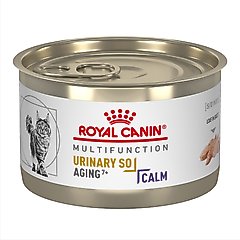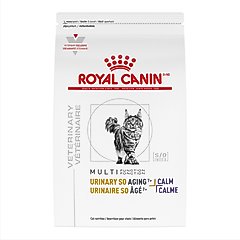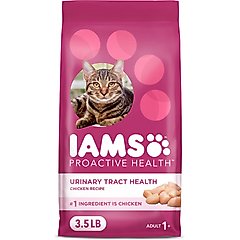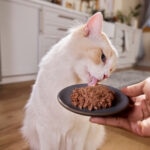The Best Cat Foods for Urinary Health, According to Veterinarians

Photo by Chewy
Keeping an eye on your cat’s urinary health is important. Not only are many cats predisposed to various urinary issues—referred to as feline lower urinary tract disease (FLUTD)—but once signs occur, immediate attention is needed.
Some common signs of urinary issues include frequent urination, straining to urinate, urinating outside of the cat litter box, and blood in the urine. All of the above mean your kitty needs to see the vet pronto. If your cat is straining and not producing urine, this may be a life-threatening emergency—seek veterinary care immediately.
One thing that can help prevent, manage, and even treat urinary issues is swapping in cat food for urinary health. Sometimes, a cat’s diet can actually contribute to urinary problems, such as urine crystals and bladder stones.
“Diet affects the pH, concentration, and mineral content of urine,” explains Colleen Guilfoyle, DVM, the national shelter medicine veterinarian at Best Friends Animal Society in Kanab, Utah. “Foods high in certain minerals—like magnesium or phosphorus—or too low in moisture can promote crystal or stone formation.”
Ahead, we’re sharing veterinarian-approved cat foods that can help promote good urinary health.
Speak with your veterinarian before changing your cat’s diet.
Key Takeaways
- Cats can experience a range of urinary health issues, including bladder inflammation, urinary crystals, and bladder stones.
- Diet plays a key role in your cat’s urinary health. It ultimately affects the pH, concentration, and mineral content of urine.
- The best cat food for urinary health prioritizes moisture content, controlled mineral levels, and urine-acidifying agents.
What To Look for in Cat Food for Urinary Health
The key things to look for in cat food that promotes good urinary health are moisture content, controlled mineral levels, and urine-acidifying agents.
- Controlled mineral levels: High levels of magnesium, phosphorus, and calcium are the building blocks of crystals, says Elliott Garber, DVM, veterinarian and founder of Creatures, in Charlottesville, Virginia. Foods with controlled levels of these minerals help prevent stone formation.
- Moisture content: Ensuring your kitty gets enough water is critical to their urinary health. “Wet foods or formulas designed to increase water intake help dilute urine and flush the bladder regularly,” says Dr. Garber.
- Urine-acidifying agents: Certain prescription or urinary-support formulas include ingredients that help maintain a slightly acidic urine pH, Dr. Guilfoyle says. This discourages the formation of struvite crystals, which tend to develop in more alkaline environments. Balanced acidity supports a healthier bladder environment overall.
Ultimately, the most effective options are veterinary prescription diets specifically formulated for urinary health. Dr. Garber explains that these have undergone clinical testing to prove they can dissolve existing struvite stones and prevent both struvite and calcium oxalate formation. (Calcium oxalate crystals are another type of bladder stones in cats.)
Best Cat Foods for Urinary Health
Here are some of the best food options for cat urinary health, according to Dr. Garber and Dr. Guilfoyle. However, speak with your veterinarian before switching cat foods, especially those that target specific health concerns.
- Best overall cat food for urinary health: Hill’s Prescription Diet c/d Multicare Urinary Care
Recommended Product
- Best wet cat food for urinary health: Royal Canin Veterinary Diet Feline Urinary SO Canned Cat Food
Recommended Product
- Best dry cat food for urinary health: Purina Pro Plan Veterinary Diets UR St/Ox Urinary Dry Cat Food
Recommended Product
- Best cat treats for urinary health: Purina Pro Plan Veterinary Diets Urinary Health Crunchy Cat Treats
Recommended Product
- Best cat food to support urinary health in senior cats: Royal Canin Veterinary Diet Multifunction Urinary SO Aging 7+ & Calm
Recommended Products
- Best non-prescription cat food for urinary health: IAMS ProActive Health Urinary Tract Health with Chicken Adult Dry Cat Food
Recommended Product
Both Dr. Guilfoyle and Dr. Garber agree that a prescription option is best to help kitties with urinary health issues. However, if your cat is healthy and you want to take preventive measures, you can try a non-prescription option.
FAQs About Cat Food for Urinary Health
How do I know if my cat needs urinary health food?
A prescription diet is needed if a cat has confirmed urinary crystals, stones, or recurrent urinary tract disease, especially if the goal is to dissolve existing stones. Signs your cat is having urinary issues include straining to urinate, having blood in their urine, and urinating outside of the litter box.
Can I feed urinary health cat food long-term?
Yes, most veterinary urinary diets are safe for lifelong feeding. In fact, cats with a history of urinary disease often do best when they remain on the diet to prevent recurrence. The main caveat is ensuring the formula meets the cat’s other health needs as they age.
What’s the difference between prescription and non-prescription urinary cat food?
Prescription urinary cat foods are formulated to treat or manage existing urinary conditions with carefully adjusted mineral content and pH balance, and they require a veterinarian’s approval.
Non-prescription urinary-support foods are available over the counter and focus more on general prevention by promoting hydration and bladder health. They are not considered strong enough to treat diagnosed problems.
Can all cats eat urinary health food, even without urinary issues?
There’s no benefit to putting a healthy cat on prescription urinary food preemptively. It won’t provide extra protection and could simply be an unnecessary expense.
Save the therapeutic diets for cats who actually need them. But if you have multiple cats and one requires a urinary diet, it’s usually fine for the others to eat it too. Ask your veterinarian if you would like to feed a therapeutic diet to otherwise healthy cats in the home.
